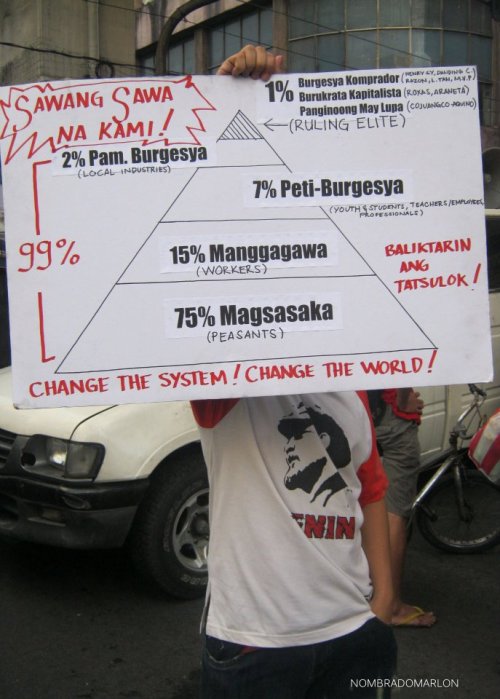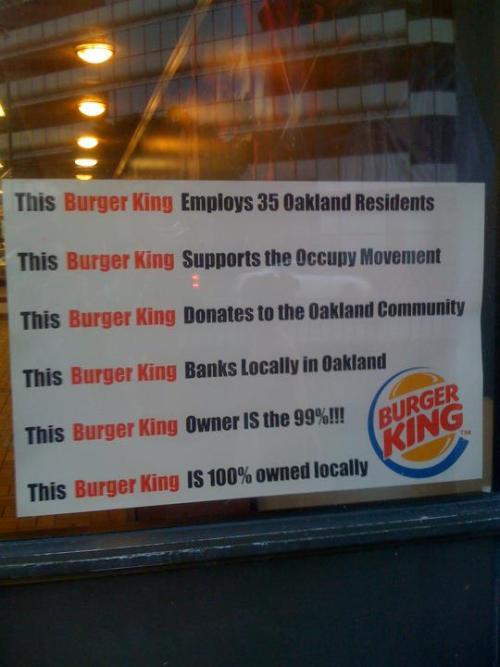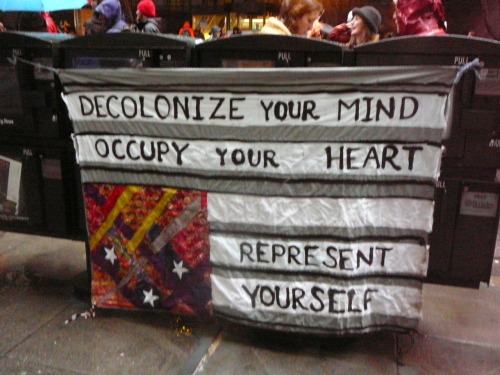

This is reflected by occupy's focus on campaign financing and relatively inconsequential legal fictions like corporate personhood. One example of this is a Democracy Now interview with an occupier:
http://www.youtube.com/watch?v=UfuMhV-tWPY
The focus on corporate personhood and campaign financing is a result of using a pluralist analysis of society. Pluralism says that policy is formulated by a bunch of different groups in society (corporations, unions, women's advocacy groups, universities, civil rights organizations etc) competing and eventually compromising based on their power and influence within political institutions. The view of pluralists is that the political system can be fixed by increasing the power of the "99%" institutions relative to the "1%" institutions. They see one of the primary problems with the American political system is that the "1%" institutions have more money to spend on influencing lawmakers and buying their elections, and propose that a way of fixing this would be public campaign financing and spending limits on campaigns. The problem is that pluralism is a load of shit.
The pluralist analysis only looks at the overt methods of capitalist domination of society, while a class analysis understands that even with affordable elections and public financing, it doesn't affect capitalist hegemony. In fact, it adds a legitimizing factor to capitalist domination of society, like in Western Europe. A class analysis recognizes that capitalist control of society is direct and indirect. The main direct methods of capitalist control are the selection of officials and lobbying. The indirect methods of control are far more powerful, because socialists and communists elected to office are still controlled by them. The four main methods of indirect capitalist control are explained in Al Szymanski's The Capitalist State and the Politics of Class :
1. Capitalist values permeate the society and are propagated through the schools, military, media, and churches. Officials typically accept capitalist ideology as their own and authentically act as if capitalist rationality were the only rationality. Attempts by state officials to enact measures that would violate capitalist ideology would generate considerable opposition, even from the oppressed, as long as they accept capitalist ideas.
2. If the state attempts to follow policies that business doesn't like, businesses can move to other countries or they may curtail production, lay off workers, or follow other restrictive policies, thereby promoting an economic crisis for which the state would be blamed. Businesses can refuse to invest unless the state follows probusiness policies. Banks have the special advantage of refusing to make loans to the state unless the state follows policies directed by them. Such actions by business might not be malicious, but might be merely economically rational and dictated by the necessity of maximizing profits.
3. States that attempt anticapitalist policies are subjected to the threat of military intervention, either by foreign states that want to prevent the abolition of capitalism, or by their own military, which may well be closely tied to the capitalist class.
4. Officials who follow anticapitalist policies may be cut off from campaign financing, slandered in the capitalist-class-controlled media, and forced to face well-financed and promoted opponents in their campaigns for reelection as well as being confronted with embarrassing demonstrations, disruptions, and possible social and political crises.
By looking at policy merely as a result of different groups compromising, it gives a distorted view of the role of the state. It sees the state as a place to mediate the interests of different interest groups in society, and doesn't have the depth, richness, and explanatory power that a class analysis has. Again, from The Capitalist State and the Politics of Class :
The capitalist state has five basic functions for capitalism: 1) the state operates to preserve the existing class relations in society through guaranteeing private property and law and order; 2) the state makes continual capital accumulation and profitability possible through regulating the labor force, ensuring sufficient buying power in the economy, regulating the economy, and otherwise helping business; 3) the state secures the legitimacy of capitalist society through its control over the schools, its management of the cult of patriotism, and the ideological function of voting to persuade people that the state is being run by and for them, when the reality is quite different; 4) the state operates to "aggregate" the diverse interests and wills of the different segments of the capitalist class - that is, form the capitalist class will - so that the state can implement unified compromise policies tempered by the demands of other classes (this is the function of the Congress and the various regulatory and administrative agencies); 5) the state raises money to fund the bureaucracy and otherwise acts to maintain the apparatus to perform the first four functions.
One of the clearest examples of capitalist class domination was the pressure put on New York city in 1975 when a cabal of bankers, led by Citigroup, refused to roll over the debt of NYC. Capitalist restructuring and deindustrialization eroded the economic base of the city and suburbanization left it impoverished. What happened was essentially a financial coup, the bail out package mandated that bondholders be paid off first, and essential services would come second. The city's economy was reconstructed around creating financial and cultural centers geared towards the elites. This management was a pioneering battle in the neoliberal project, and this neoliberal approach to crisis has been repeated numerous times by the IMF and by the European Central Bank's handling of Greece today.
Lobbying and corporate donations have to be seen as one tool in the vast toolbox of capitalist control of society. While many people use the "99% vs 1%" analysis as a sort of watered down class analysis, the pluralist usage of it is inadequate to deal with the realities of capitalist control of society.
You can read more of my posts on my blog: http://malheureuxmarxist.wordpress.com/



